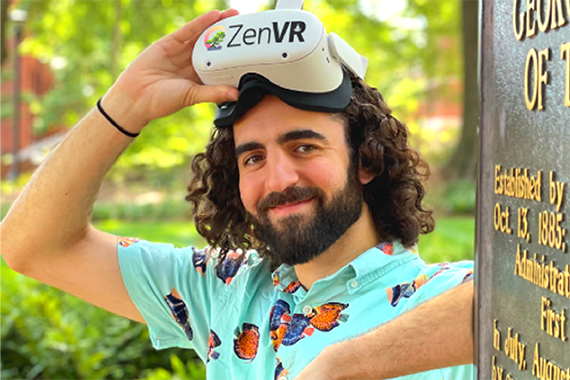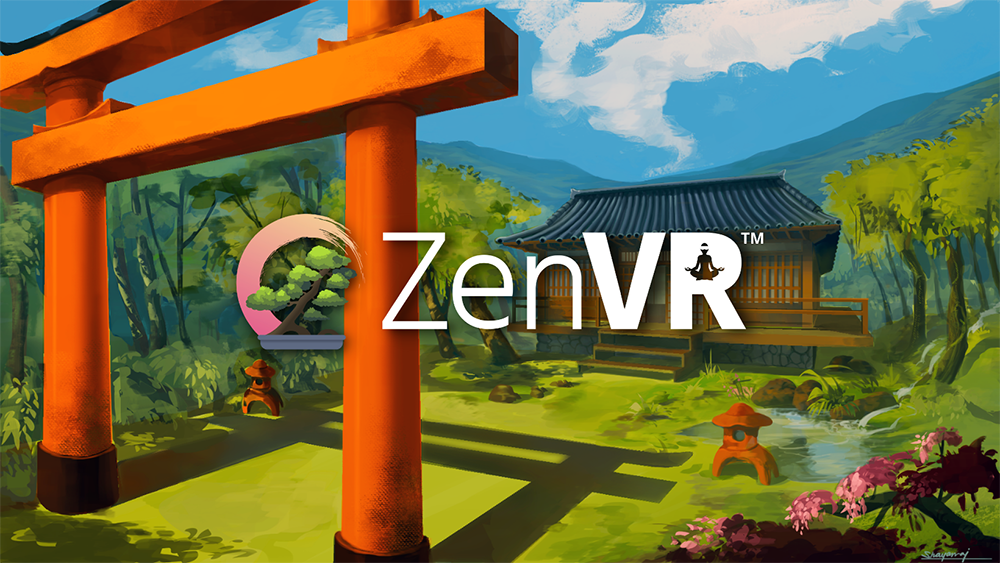ZenVR
Matt Golino, Georgia Tech '15, and his app, ZenVR, are here to take your meditation to the next level.

Close your eyes. Imagine yourself standing in a valley. A light breeze ruffles the grass around you, and the sun is lightly shining on your face. Birds are chirping, and in the distance, you can see a quiet river making its way through the landscape.
How do you feel?
With any luck, this brief visualization exercise left you momentarily relaxed—one of the many benefits of meditation, which cannot only improve your mental health but your physical health, as well. In the past decade, meditation has been on the rise, with the CDC noting the percentage of adults who practiced some sort of meditation in the last 12 months more than tripled from 2012 to 2017. And while new data isn’t readily available, all signs point toward continued increases in meditation post-pandemic as mental health has become a higher priority for many.
A number of apps such as Headspace or Calm are already on the market that are designed to help with meditation, mindfulness and sleep, but Delta Upsilon alumnus Matt Golino, Georgia Tech ’15, is trying to take your meditation practice to the next level … and into virtual reality.
Matt is the CEO/CTO of ZenVR, a meditation learning system taught in virtual reality. The immersive experience features progressive lessons led by an instructor to help users grow their practices, not just provide one-off sessions of relaxation or mindfulness.
The concept for ZenVR was born from Matt’s personal journey with meditation and his desire to share it with others. As an undergraduate at Georgia Tech, he found meditation to relieve stress from his rigorous course load. Starting with the basics, Matt eventually found a nearby Buddhist monastery to further his practice. Through his lessons, Matt learned that there can be more to meditation than a series of unconnected sessions. Meditation skills can be built over time through progressive lessons—both alone and in a group.
“The idea with ZenVR is to teach meditation beyond just relaxation,” Matt said. “It's always been about teaching this in a way that can be applied to your everyday life.”
ZenVR’s goal is to replicate an in-person meditation experience similar to Matt’s that combines lessons, philosophy and community. The VR headset takes users into the “ZenVR valley” where they will take class inside a dojo, learn and practice a new meditation technique, then receive a philosophy talk that can be integrated into everyday life. Then, should they choose, users can find community within ZenVR Discord and Facebook discussion groups to further explore class material and connect.
Still in its early stages, ZenVR stemmed from Matt’s master’s thesis at Georgia Tech and officially launched in August 2021. The ZenVR team consists of Matt and two additional employees, Zen teachers who help build curriculum, and an advisory board that is looking into how to bring ZenVR into the corporate space, as well as treatment and counseling centers. Next stages for ZenVR include launching additional classes, adding new locations to the “ZenVR valley,” and building multi-player infrastructure to facilitate users interacting within the app.
Early research is also showing ZenVR works. Through its own research, the company evaluated a small group of participants prior to using ZenVR and again after a few weeks of use. During that time, participants and saw significant increases in mindfulness and self-reported mediation ability. (See https://www.zenvrapp.com/post/vr-meditation-research-study for more.) This type of success could not come at a better time as Open Minds reports mental health spending is up 50 percent in the U.S. since 2009. The World Health Organization also reports that global prevalence of anxiety and depression increased by a massive 25% within the first year of the COVID-19 pandemic.
“I think there's ways that you can say that [the pandemic] has brought mental health and the mental health needs of our society more to the forefront of everyone's mind,” Matt said. “And not only are people talking about it, they're really looking for solutions to address it, and ZenVR is there.”
For Matt and his team, the fact that ZenVR is on a virtual reality platform adds to the product's excitement and potential. It offers a new avenue for people to explore meditation in an immersive setting when in-person opportunities can be hard to find.
“I would compare virtual reality right now to where iPhones and smartphones were in the early 2000s and 2010s, where basically, it started off as a bulky novelty item that a few people had. And maybe a decade and a half later, you can't imagine living without a smartphone,” Matt said. “The tech is moving fast. I think if you've tried VR, you are kind of like, ‘Oh, this is here now. This is happening now.’ And you can either jump onto the bandwagon in five years or you can be one of the first app creators now. And to me, that's exciting to be on the cutting edge and the forefront of that.”
Along with Matt on the VR bandwagon is his chapter brother, Eric Bruce, Georgia Tech ’14, who serves as Head of Marketing for ZenVR. While the two were in the chapter at the same time, Matt and Eric’s friendship grew post-graduation over a shared love of VR. After turning Eric onto meditation and starting the ZenVR project, Matt invited him to join the team to help spread the word about ZenVR and its benefits.
“[Virtual reality] is going to be part of a revolution in how we learn any topic in the future, especially visual learners, people who need more than just auditory speech, basically,” Eric said. “Matt sharing his passion with me and growing my own journey with meditation really allowed me to see his vision and help him innovate in some exciting ways in the virtual reality market.”
Today, ZenVR can be found on Meta Quest, Oculus Rift and SteamVR, and for anyone looking to start a meditation practice, Matt has two main pieces of advice: be consistent and stay curious.
“If you can only sit for five minutes a day, that's way more powerful than just, ‘oh, I sat for 30 minutes once a month.’ That five minutes a day will make such a huge impact in your life,” Matt said. “Notice what's happening and be curious about it. And be curious about exploring and learning more because there's a lot more to learn.”
Find ZenVR at: MetaQuest, Oculus Rift and SteamVR

